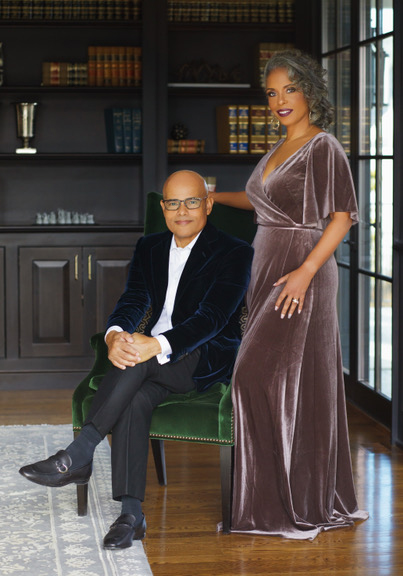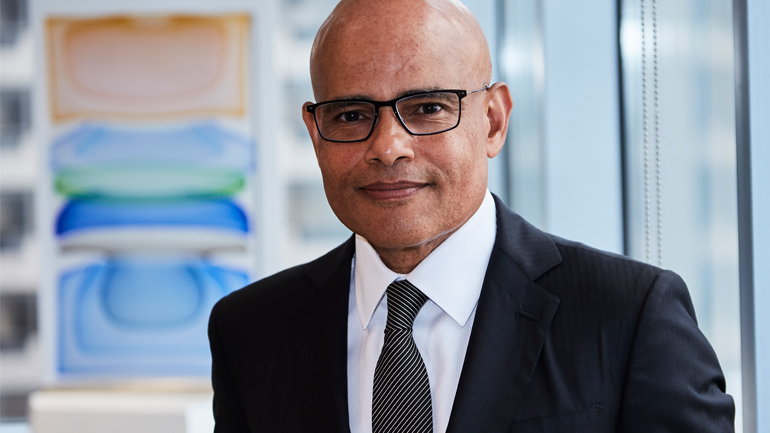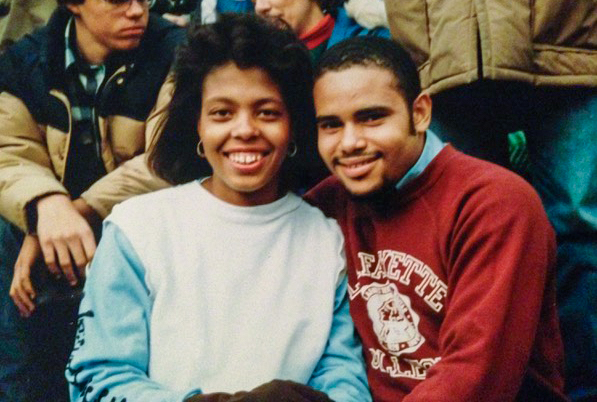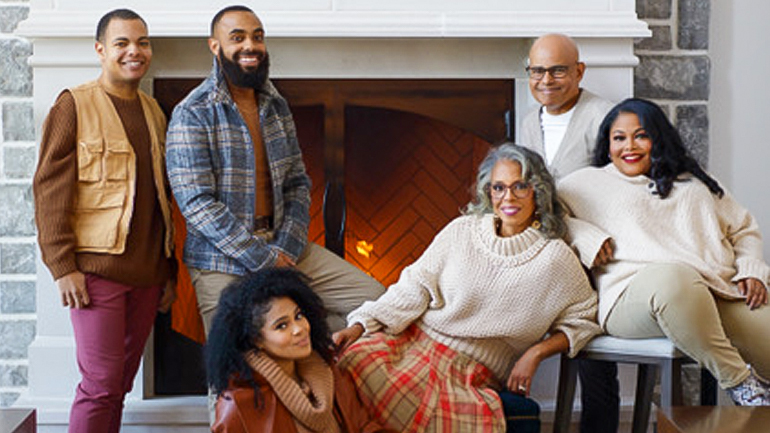People Helping People
By Stella Katsipoutis-Varkanis
 On her first day as a first-year student at Lafayette, Tracy Ross ’85 was approached by an African American upperclassman, who invited her to a party. A few hours later, she walked with six of her classmates to the off-campus student house where members of the Association of Black Collegians (ABC) were gathering for the celebration. As the young women approached the house, Robert Ross ’83 spotted them from the roof. Pointing Tracy out, he said to his friend, “I’m going to marry her one day.”
On her first day as a first-year student at Lafayette, Tracy Ross ’85 was approached by an African American upperclassman, who invited her to a party. A few hours later, she walked with six of her classmates to the off-campus student house where members of the Association of Black Collegians (ABC) were gathering for the celebration. As the young women approached the house, Robert Ross ’83 spotted them from the roof. Pointing Tracy out, he said to his friend, “I’m going to marry her one day.”
From that day forward, Rob—now one of the premier personal injury litigators in the nation—and Tracy—now a minister and Christian counselor—formed a bond that would forever change not only their own lives, but those of countless others they have impacted throughout their 33-year marriage and respective careers.
While the paths that brought Rob and Tracy to Lafayette were largely different, their journeys converged when they met through their studies and led them to a common professional goal: to help improve the lives of others, no matter what their backgrounds and no matter what their current circumstances.
“I grew up in a Boys & Girls Club in North Philadelphia, and so I’m a product of what nonprofits can do, in particular for young people who live in very stressed communities,” Rob says. “And because of that fact, I’ve always understood the responsibility of giving back. I also ended up at Lafayette as a result of my Boys & Girls Club. Rev. John Kinard [’52], who was a board member at the Boys & Girls Club as well as at Lafayette, happened to be at my club one day, and I was introduced to him. It was my senior year [at Germantown High School in Philadelphia], and he asked me where I had applied to college. I told him I didn’t have a college counselor, and I hadn’t applied to any colleges yet. He told me to meet him the following week, and when I came back, sure enough, he had an application to Lafayette. I had never heard of Lafayette until then, and it was literally the only school to which I applied.”
Upon entering the College, Rob knew exactly which degree he wanted to pursue: a Bachelor of Arts in government and law. In fact, he had known he wanted to be a lawyer since his third-grade teacher asked him to tell the class what he wanted to be when he grew up. At Lafayette, Rob was able to work toward achieving his lifelong dream, but it wasn’t without challenge.
“Coming out of a public school in a really stressed inner-city area, it was tough for me to do well at Lafayette, because the level of education was so much higher than what I received in high school,” Rob says. “Also, because the environment back when I was at Lafayette was very segregated, it was a difficult experience. My high school was pretty much 100 percent black in terms of the students, and at Lafayette it was almost the reverse—it was a completely new environment for me. I remember a conversation I had with the late dean David A. Portlock midway through my first semester, when I was struggling in a couple of classes, when he said to me, ‘Look, as you can tell, Lafayette doesn’t typically recruit students from where you live and from schools like yours. And if you don’t do better here, and if you don’t buckle down and work hard and succeed, they’re not going back there. It’s really important that you do well and blaze the trail for others who come from where you come from.’ While he put a lot on my shoulders by saying that, I took on that responsibility. It made me work hard in order to get through, and having to succeed in a difficult environment and face those kinds of challenges at Lafayette gave me the work ethic and the drive to face those challenges outside of school.”

Robert Ross ’83
And it was quite a trail he blazed. After graduating from Lafayette, Rob received a Juris Doctor degree from Cornell, worked as a commercial litigator for 10 years, and was then introduced to the world of catastrophic injury law. As founding partner of Ross Feller Casey LLP, Rob has amassed a nationally renowned list of victories representing those catastrophically injured over the last 23 years. His work has resulted in more than a half billion dollars in verdicts and settlements for his clients—including a record-setting $44.1 million verdict on behalf of Andrea Tate, who suffered a brain injury as a result of medical malpractice at the Hospital of the University of Pennsylvania.
“Because I represent catastrophically injured people, I love trying to give them some sense of not only justice, but some sense of wholeness again,” Rob says. “When we are successful on behalf of one of our clients, we’re able to get them services that they badly need but can’t afford. We get them rehab services, we can get their homes modified, and we can get them the medical care they need. It’s extremely rewarding that we not only can help the clients, but we actually help the entire family.”
Outside his firm, Rob is an ordained deacon and does various forms of ministry—such as leading marriage workshops and retreats, teaching Sunday school, and supporting summer reading programs—alongside his wife, Tracy, who stumbled upon her vocation as a minister.

Tracy Ross ’85 and Robert Ross ’83 at Lafayette.
Like Rob, Tracy found herself at Lafayette thanks to a twist of fate. While attending The Hun School of Princeton in New Jersey along with her cousin, with whom she was very close, she decided to apply to Lafayette after her cousin enrolled there.
“The Hun School is one of the feeder schools into Lafayette, which I didn’t know at the time, and they recommended it all the time to various students,” Tracy says. “And so, I said why not? I applied to a variety of schools, most of which were all-women schools, and I just didn’t want to go to those schools. What it boiled down to was financial aid. I was raised by a single parent, and my mom said I had to go with the school that was most accommodating. So, since I was familiar with the school because of my cousin, I ended up at Lafayette.”
Unsure of what career path she wanted to follow, Tracy initially chose to major in engineering at the encouragement of her mother. However, as she began struggling to maintain interest in her coursework, she realized it was time to follow one of her deepest passions: art.
“In sophomore year, I was on academic probation, and midway through the year I got a notification to see a dean, and it basically said I had to take a semester off because I wasn’t performing,” Tracy says. “Fortunately, Rob was working in the dean’s office at the time, and he petitioned for me to stay if I changed my major. So, I ended up as an art major, because that’s what I loved to do.”
Tracy thrived as an art major, and though she may not have known what the future would hold for her at the time, she now specifically remembers her path being foreshadowed through the artwork she created.
“In one of my religion courses, I chose to create a drawing as my final,” Tracy says. “And it was a drawing of people on a wall—black, white, whatever—just pulling people from one side of the wall to the other, just trying to give them opportunity. I was thinking along those lines even back in college, that it is really important that people help people.”
In contrast to Rob’s experience, the lack of diversity on campus didn’t come as a shock to Tracy, but being in such a small minority still proved difficult. Luckily, Tracy, Rob, and their fellow African American classmates—just like the people in Tracy’s painting—found refuge in each other through campus programs like ABC and Black Children Can.
“I was used to a small private school environment, so it was familiar for me,” Tracy says. “I came from a background where I was prepared to be the only black person in a classroom, because that was my life in high school. I was drawn into the life of the African American students with ABC, because the moment I arrived on campus the black kids just swooped me up. It helped me identify much more with my own cultural background, and I gained the comfortability of being in various environments. If there wasn’t such a small number of black students there, I might not have fallen into that. It was a challenge for a lot of the black students to be in that environment, but if we didn’t go there, we wouldn’t have each other.”
“In my wife’s freshman class, there were seven black women. That’s it,” Rob adds. “We probably only had about 18 black students in my freshman class, total. Including all four classes that were there, it was probably less than 50. So, you couldn’t help but know every black student on campus. We were all very close. We ate together, we had our own section in the cafeteria, and our entire social life was through ABC, the Association of Black Collegians. That was our home, it was our networking system, and it’s how we held each other up. And I just don’t know how we would have made it without having such an impactful organization.”
Rob and Tracy also found great support in each other throughout their years at Lafayette and credit one another for being each other’s biggest cheerleaders. In 1984, not long after their fortuitous meeting at the ABC party, they were engaged to be married. After graduation, Tracy returned to her hometown of Trenton, N.J., and married Rob shortly thereafter, in 1986. She completed the Alternate Route to Teaching program in hopes of sharing her love for art with younger generations. For 13 years, she taught various grades—ranging from kindergarten to sixth—until she decided to take a year off to raise her and Rob’s four children at home. It was then that she heard her true calling to minister.

“A friend of mine introduced me to something called Bible Study Fellowship International (BSF),” she says. “We were already a churchgoing family, but when I got to this particular Bible study, I learned some things in a very different way, and I wanted people to know what I was learning. My 13 years of teaching children prepared me for teaching adults. So, I went to Philadelphia Biblical University—now it’s called Cairn University—to get my Master of Science in Christian counseling in 2011 and my Master of Divinity degree in 2016. Going back to school when I was 40 was daunting, but it was one of the best decisions I’ve ever made.”
Today, she continues to positively impact the lives of others through her ministry seminars, individual and marital counseling, Bible teaching, and more. She also continues to employ the lessons she learned at Lafayette about inclusion in her ministry today.
“I love butterflies,” she says, “and I have butterflies all over my office because I’m passionate about transformation. My main goal is to help people make choices so they can get the best out of their lives. People don’t have to remain where they are. Even if you have a good life, there’s always an option to have a better life, and change starts from the inside. I also have to make sure I’m not isolated into any one particular group of people. I have to use the skills that I got at Lafayette as far as being comfortable in my own skin, no matter who I’m around. My main purpose in life is to help one person at a time, one family at a time.”
Rob and Tracy agree that their greatest accomplishment in life, however, is having raised four children who are also passionate about helping others.
“Our union produced a strong and loving family of people who want to make the world a better place,” Tracy says. “Our children are not just good people who are doing well in life, but people who care about the world and care about other people. They would gladly give their last dime to help someone else. I’m proud that we raised children who can see past differences in people. They’re really compassionate, and that’s an accomplishment—especially in this day and age.”
If you ask Rob and Tracy what their most cherished memory of Lafayette is, they will, of course, say it was meeting each other. But they also are grateful for the education they received—as well as the hurdles they overcame—at Lafayette for not only bringing them together, but also leading them to careers and a family in which they can do what they love most: making the world a better place.
“Regardless of the circumstances from which they came,” Rob says, “the education students can get at Lafayette allows them to not only make it in various professions, but can allow them to be at the very top of what they choose to do, not only in their professional capacity, but also in their civic and nonprofit capacity.”
“College education is much broader than students learning their subjects and developing study skills,” Tracy adds. “Learning about yourself, learning about how to be in different environments, learning how to network, learning teamwork—those things are very important. You have a chance to really figure out who you are and develop yourself, and I think that’s the most important thing anyone walks away with from their college experience. Whether you think of it in a positive or negative vein, you can allow it to shape you in a positive way. And so, my hope is that students today will take everything Lafayette has to offer and use it to grow and develop.”
Learn more about Ross and his work through Ross Feller Casey LLP.